 August 2024 in “Frontiers in Pharmacology”
August 2024 in “Frontiers in Pharmacology” Antibody treatments show promise for hair loss but need more research.
 April 2024 in “Expert opinion on investigational drugs”
April 2024 in “Expert opinion on investigational drugs” JAK inhibitors are safe and effective for treating moderate-to-severe alopecia areata.
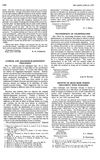
A bald man grew hair on his head after taking a drug called diazoxide, but lost it again when he stopped the medication.
 3 citations,
December 2020 in “Medical Journal of Cell Biology”
3 citations,
December 2020 in “Medical Journal of Cell Biology” Stem cell technologies are mostly effective in treating diseases and repairing tissues.
 1 citations,
December 2019 in “Protetyka Stomatologiczna”
1 citations,
December 2019 in “Protetyka Stomatologiczna” Platelet-Rich Fibrin shows promise in medicine and dentistry, but more research is needed to standardize its use.
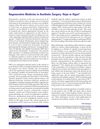 1 citations,
January 2014 in “Journal of Cutaneous and Aesthetic Surgery”
1 citations,
January 2014 in “Journal of Cutaneous and Aesthetic Surgery” Regenerative medicine shows promise for aesthetic surgery, but needs more research for widespread use.
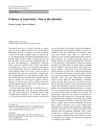 July 2014 in “American Journal of Clinical Dermatology”
July 2014 in “American Journal of Clinical Dermatology” The editorial concludes that while evidence-based medicine is crucial, doctors should also use their own experience and consider patient preferences in dermatology care.
 April 2023 in “Tikrit journal of pharmaceutical sciences”
April 2023 in “Tikrit journal of pharmaceutical sciences” Most people in Tikrit, Iraq, have used herbal medicine, mainly for hair, skin, and digestive issues, hoping for effective treatments.
 7 citations,
September 2008 in “Dermatologic surgery”
7 citations,
September 2008 in “Dermatologic surgery” Hair transplantation can successfully treat stubborn alopecia areata.
 September 2003 in “Journal of the Royal Society of Medicine”
September 2003 in “Journal of the Royal Society of Medicine” Understanding breast cancer requires considering both medical advancements and social influences.
 1 citations,
March 2021 in “Current Dermatology Reports”
1 citations,
March 2021 in “Current Dermatology Reports” Various treatments help hair growth, but more research needed for safety and effectiveness.
 59 citations,
June 2022 in “Frontiers in medicine”
59 citations,
June 2022 in “Frontiers in medicine” There are still challenges in diagnosing and treating chronic skin diseases, but there is hope for future improvements.
 1 citations,
March 1992 in “Postgraduate Medicine”
1 citations,
March 1992 in “Postgraduate Medicine” About 40% of women by age 60 experience significant hair loss, often due to androgenetic alopecia, with treatments like minoxidil available and hope for future cures.
 60 citations,
April 2012 in “Physiology”
60 citations,
April 2012 in “Physiology” The document concludes that understanding hair and feather regeneration can help develop new regenerative medicine strategies.
 November 2020 in “Dubai medical journal”
November 2020 in “Dubai medical journal” Tofacitinib may effectively regrow hair in alopecia totalis patients.
 May 2018 in “Academic Medicine”
May 2018 in “Academic Medicine” Hair loss can cause significant emotional and psychological distress.
 47 citations,
July 2013 in “Pharmacological Reviews”
47 citations,
July 2013 in “Pharmacological Reviews” Regenerative pharmacology, which combines drugs with regenerative medicine, shows promise for repairing damaged body parts and needs more interdisciplinary research.
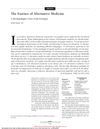 22 citations,
November 1998 in “Archives of Dermatology”
22 citations,
November 1998 in “Archives of Dermatology” Alternative medicine lacks scientific support and relies on the placebo effect, but remains popular and integrated into German healthcare.
 13 citations,
February 2016 in “Clinical Medicine”
13 citations,
February 2016 in “Clinical Medicine” The document concludes that diagnosing and treating hair loss is complex and requires understanding its psychological effects and underlying causes, while also calling for more research and new treatments.
 9 citations,
March 2011 in “Current Pharmaceutical Biotechnology”
9 citations,
March 2011 in “Current Pharmaceutical Biotechnology” Stem cell therapies show promise for treating various diseases but face challenges in clinical use and require better monitoring techniques.
8 citations,
June 2021 in “Annals of internal medicine” Experts recommend a team-based approach to treat patients with long-lasting COVID-19 symptoms and emphasize the need for ongoing research.
 1 citations,
August 2023 in “Frontiers in immunology”
1 citations,
August 2023 in “Frontiers in immunology” Traditional Chinese medicinal foods may help manage long-term post-COVID symptoms.
January 2014 in “International Journal of Clinical Medicine” Premature aging increases the risk of immune problems and autoimmune diseases.
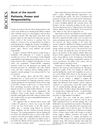 September 2003 in “Journal of the Royal Society of Medicine”
September 2003 in “Journal of the Royal Society of Medicine” The book is a comprehensive guide for forensic practitioners and exam candidates.
 127 citations,
June 2008 in “British Journal of Clinical Pharmacology”
127 citations,
June 2008 in “British Journal of Clinical Pharmacology” Low doses of some substances can be beneficial, while high doses can be harmful or toxic.
 48 citations,
September 2017 in “Frontiers in Bioscience”
48 citations,
September 2017 in “Frontiers in Bioscience” Nanoparticles show promise for better wound healing, but more research is needed to ensure safety and effectiveness.
 40 citations,
May 1987 in “The Lancet”
40 citations,
May 1987 in “The Lancet” Minoxidil helps some bald men, but most lose hair again when stopping.
 18 citations,
February 2016 in “The Journal of Clinical Endocrinology and Metabolism”
18 citations,
February 2016 in “The Journal of Clinical Endocrinology and Metabolism” Advancements in male reproductive medicine are ongoing, but more research and improved treatments are needed in several areas.
 5 citations,
June 2012 in “QJM: An International Journal of Medicine”
5 citations,
June 2012 in “QJM: An International Journal of Medicine” The lecture concluded that drugs for human enhancement are here to stay and called for their responsible development and fair access.
 September 2003 in “Journal of the Royal Society of Medicine”
September 2003 in “Journal of the Royal Society of Medicine” The book has valuable information but is hard to read due to poor writing.




























